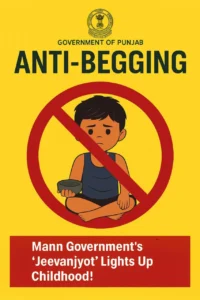Chandigarh, September 19: Punjab’s streets, once dotted with children holding begging bowls, are now seeing many of them step into classrooms instead. Chief Minister Bhagwant Singh Mann’s government says its “Project Jeevanjyot” has begun changing lives, turning a long-standing social challenge into what officials call a “national model” against child begging.

Launched in July 2024, the initiative’s first phase continued until June 2025. In that period, authorities carried out 753 raids and rescued 367 children. Of these, 350 were reunited with their families, 17 were placed in child care institutions, and 183 were enrolled in schools. Another 30 children were linked to sponsorship programs, while eight were sent to Anganwadis. The figures, officials noted, underscore that the program aimed not just at removing children from the streets temporarily but at integrating them into mainstream society.
The second phase, “Jeevanjyot 2.0,” began in July 2025. By August 25, officials had already conducted 523 raids, rescuing 279 children. Of these, 137 were sent home on the same day, while 142 were placed in child care facilities. DNA samples were taken from 15 children to establish identity, a step the government described as proof of its use of modern technology for safety and accountability.
Social Security, Women and Child Development Minister Dr. Baljit Kaur said the project’s goals extend beyond rescue missions. “Children’s childhood should be in schools, not on the streets. Project Jeevanjyot 2.0 is a big step towards the Punjab of our dreams,” she noted.
Officials emphasized that the project addresses the roots of child begging—poverty, drug addiction, and exploitation of children trafficked from other states. Families are being connected to employment schemes, nutrition programs, and educational support, making what the government calls a “360-degree model” of rehabilitation. So far, 311 children have been integrated with education, healthcare, counseling, and social support.
Special rescue teams have also been deployed at large gatherings, such as the Jor Mela in Kapurthala, to prevent children from being pushed into begging during festivals. Public participation, too, has been critical, with residents increasingly reporting cases of child begging through Child Helpline 1098.
The government is now preparing to introduce a strengthened legal framework against child begging, which it says will serve as a national benchmark. The proposed law aims to punish those exploiting children and guarantee their right to education, healthcare, and dignity.
Officials noted that Punjab’s model demonstrates how a mix of strong political will, community support, and clear policies can turn vulnerable children’s futures away from the streets and toward schools.


